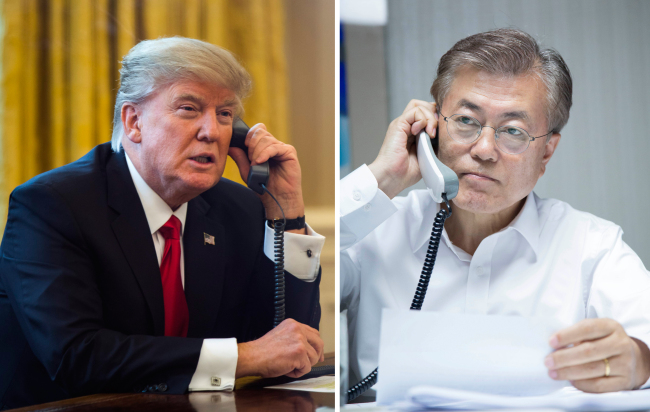In his second week as Korea’s new president, Moon Jae-in faces an uphill battle in the global trade arena, as he has to mend fences with the nation’s major trading partner, the US.
One of the biggest economic issues in the domestic trade industry is US President Donald Trump’s vow to renegotiate the terms of the five-year Korea-US FTA. He has referred to the deal as “horrible.”
The KORUS FTA has reported an annual average of more than $65 million in exported goods to the US from export-heavy Korea since its enactment, according to the US Census Bureau.
During his campaign trail, advisers to then-presidential candidate Moon maintained the stance that the new administration would not expect changes in the current free trade agreement polices to do any major damage to the country’s trade industry.
Last week, President Moon spoke with Trump on the phone, in his first official interaction with a foreign leader after taking office. According to reports, both leaders emphasized the importance of bilateral ties.
“President Trump, during the phone conversation, first delivered congratulatory remarks, then said the FTA should be renegotiated for the mutual interest of both countries,” a Cheong Wa Dae official was quoted as saying, noting that Trump raised the issue of trade first, before discussing issues on North Korea.
Moon reportedly did not offer a specific reply to Trump’s comment on trade negotiations.
“The bilateral alliance has always been the root of our diplomatic and national security policies, and will continue to remain so,” Moon was reported as saying in his call to Trump, who had added that he would send an advisory group to Seoul to further discuss relations between the two nations.
If the US decides on renegotiation of the free trade agreement, it must gather views from its Congress for the 90 days that follow, before notifying Korea.
If renegotiation is successful, the agreement will be revised. If renegotiation fails, the FTA will be discarded after 180 days from the final negotiation date.
On his campaign trail, Moon had said that if Washington makes demands based on its interests, Korea would also make demands related to its own interests in the renegotiation.
According to the American Chamber of Commerce in Korea, Korean companies in the US have created more than 45,000 jobs in local communities since the FTA was enacted, allowing Korea to become the second-largest foreign direct investor from Asia in the US.
Kilaparti Ramakrishna, director of the subregional office for East and North East Asia of the UN Economic and Social Commission for Asia and the Pacific, told The Korea Herald in an interview Friday that “rising uncertainty” is one of the key economic challenges facing Korea today.
The Korea Development Institute projects that the renegotiation of the Korea-US free trade agreement and the loss of tariff concessions might result in upwards of $26.9 billion in lost exports and roughly 240,000 lost jobs by 2021.
According to recent data from the US Department of Commerce last week, Korea’s trade surplus with the United States dropped nearly 25 percent in the first quarter of this year, with its US trade partner ranking falling from No. 6 to No. 8.
The country has recorded the largest drop among America’s 10 major trading partners this year. Compared to last year’s first quarter, the country’s trade surplus with the US decreased by roughly $1.9 billion or 24.6 percent this year.
James Kim, the chairman of AmCham, has long referred to the KORUS-FTA as a vital part of Korea’s economy and refers to the deal as a “win-win” for both the US and Korea.
During a conference last month with then-presidential candidate Moon, Kim spoke of foreign trade investments as a vital part of the country’s economy, as foreign-invested firms make up 20.9 percent of the nation’s total exports and 5.7 percent of jobs.
“One of our top objectives is to generate more economic opportunities for (the) Korea-US FTA and foreign trade investments,” Kim said.
Citing a slow growth rate and strict regulations as some of the difficulties that international investors in Korea may face, Moon vowed to tackle these issues as the nation’s leader.
“When we look at the foreign direct investment rate to the national GDP, it only reaches 12.9 percent, which is far below the average rate of 35.6 percent of the Organization of Economic Cooperation and Development,” Moon said.
“I will actively support foreign investors and alleviate government regulations to boost their investment,” he added.
By Julie Jackson (
juliejackson@heraldcorp.com)





![[Herald Interview] 'Korea, don't repeat Hong Kong's mistakes on foreign caregivers'](http://res.heraldm.com/phpwas/restmb_idxmake.php?idx=644&simg=/content/image/2024/11/13/20241113050481_0.jpg)

![[KH Explains] Why Yoon golfing is so controversial](http://res.heraldm.com/phpwas/restmb_idxmake.php?idx=644&simg=/content/image/2024/11/13/20241113050608_0.jpg)
